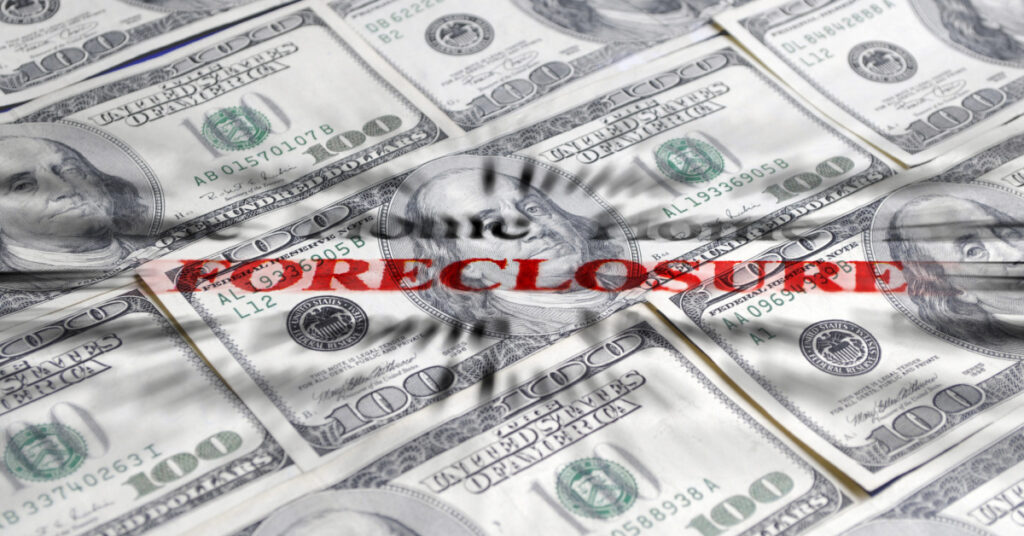If you're new here, you may want to subscribe to my RSS feed. Thanks for visiting!
Author of How to Prep When You’re Broke and Bloom Where You’re Planted online course
How do people become homeless?
It’s a question that a lot more people are asking this year. The number of foreclosures in America has climbed for eight months straight as of October, and evictions also appear to be on the rise, though this number is harder to track. It’s not about laziness – many of the people who face losing their homes are employed and just struggling to keep their heads above water.
The way foreclosure or eviction happens to people is so easy, it’s scary.
Foreclosure can happen to nearly anyone.
According to a report on CBS News, most foreclosures are for one simple reason: the homeowner loses all or part of their income.
Roughly 94% of mortgage defaults occur after a homeowner loses income to extenuating circumstances, according to The Urban Institute, citing data from the National Bureau of Economic Research.
Todd Teta, chief product and technology officer at ATTOM, a real estate data company, says we’re about to face another problem that could end in a new rash of foreclosures. People with variable interest rates are about to see their payments go up.
A high-interest-rate environment can be particularly challenging for homeowners with variable-rate loans, which reset at certain intervals in part based on market conditions. That means a homeowner might see a major jump in their monthly mortgage payment if their reset occurs when interest rates are elevated.
More such loans are now hitting their reset periods, Teta noted, a trend he expects to continue. “While there has been a small dip in interest rates, they remain significantly higher than just a few years ago, so borrowers with upcoming resets are still likely to see sizable payment increases.”
You are supposed to receive notice that your mortgage is falling into default, but more and more people are saying that they are getting very little notice to vacate their homes – sometimes only a few days.
Renters are also hitting hard times.
Rents in America are ridiculously high in many areas, and nearly impossible to find in other areas. This is harder to track than foreclosures for two reasons.
Nobody official is keeping track of evictions, so we have to rely on extrapolated data from regions that do have somebody watching. One example of this is a company called “Eviction Lab” that tracks data from ten states, but only in specific cities and counties in those states. Even with this sparse reporting, their home page shows more than a million evictions over the last year, and more than 78,000 just last month.
The other reason we don’t have official numbers is something called “informal evictions.” Some states have laws against dramatic increases in rent, but not all states do. Both my daughter and I, living in a metro area, have faced a vast increase in rent when our leases were up. For my daughter, the increase was $900 a month and for me it was $600 a month.
Landlords – particularly corporate landlords – can be tricky about this. They can make “improvements” that the tenant doesn’t want, which drives up their rent, or, if the local law allows, they can simply include it in the lease renewal. Imagine having your monthly payments go up by $600-$900 per month. If your budget is already tight, that’s all it will take to put you in a very bad situation.
Winter is coming.
A lot of folks think that people cannot be evicted in the winter. A lot of folks would be wrong. According to RocketLawyer:
You can evict tenants at any time, so long as you follow the appropriate state or local laws for eviction. There may be some limits, however, when it comes to removing the tenant physically from a unit during extreme weather…
…Tenants have no special legal rights to prevent evictions from occurring during the winter. During periods of extreme cold, however, some jurisdictions may refuse to enforce a valid eviction order until the temperature rises.
Often, during extreme cold or other extreme weather, local law enforcement will not physically remove tenants from their units. Additionally, landlords can face legal consequences for turning off utilities during extreme cold, even after a court issues an eviction order.
So, to make a bad situation even worse, imagine becoming homeless during the coldest part of the year.
Coming to an area near you
It’s important to note that there are, of course, people and companies who profit from the hard times of others. If it’s a new lease and a new tenant, landlords can make the rent whatever they want it to be in most places, which means your apartment, with no improvements, will be rented to somebody for a lot more than you pay. Huge companies are buying up large rental properties and snapping up foreclosed properties, and it’s soon going to turn us into a nation of renters…if we can afford the rents they’re charging.
I came across this video that is a collection of people on the verge of homelessness. The specific reasons are many but overall, it’s just like the statistics say: they lost all or part of their income. Watch below.
What do you think?
As someone who has lost her home to foreclosure in the past, my heart goes out to the folks who are struggling. If you are in or near this situation, here’s an article that could help you. Some of the links are no longer good, but I plan to update the post soon. Still, the general ideas apply.
Have you ever lost a home to foreclosure and eviction? How did it happen? Did you have a place to go? What did you do to find a new place to live? Please share your stories in the comments section.
















One Response
It’s happened to me. It all started when I bought my first home. I don’t think my finances really were sufficient to buy it but I was obsessed with not renting. Then I got a good job that paid better than many others around me, it was an excellent fit. It was even close to the house! Things went on for a while – then the company I was working for decided to outsource all their workers to overseas. I actually helped train my replacement! By the way, that company was getting bonuses/tax writeoffs for hiring locally. So yes, they kept perhaps two people who worked locally and outsourced everything else. I was let go.
The only job I could get paid a whole lot less and had a very long commute. Things started getting tougher. Then Washington Mutual, the bank who held the mortgage, gave me some bad advice and lost some paperwork. Foreclosure proceedings began. A friend promised me work on a ranch in Nevada. Not seeing much of a better option I downsized, giving most of my belongings. I headed south, living in a tent with my spouse, times were very hard. The offer of work fell through. In November. We headed further south to Arizona, ending up in someone’s backyard.
I found more work there, work that had paid training. It was the same crappy stuff I’d been doing but paid two dollars an hour better, with a lower cost of living. We finally got a toehold. Moved into a little crackerbox apartment. Worked our way up from there. The foreclosure eventually fell off my credit rating and I bought a much better house. During this I’d found a much better job than the original one! Our situation is far better than it was before but it took time, grit, partnership and years of work.
Oh, and Washington Mutual? They eventually “made it right.” Gave me a whole three thousand dollars in apology!